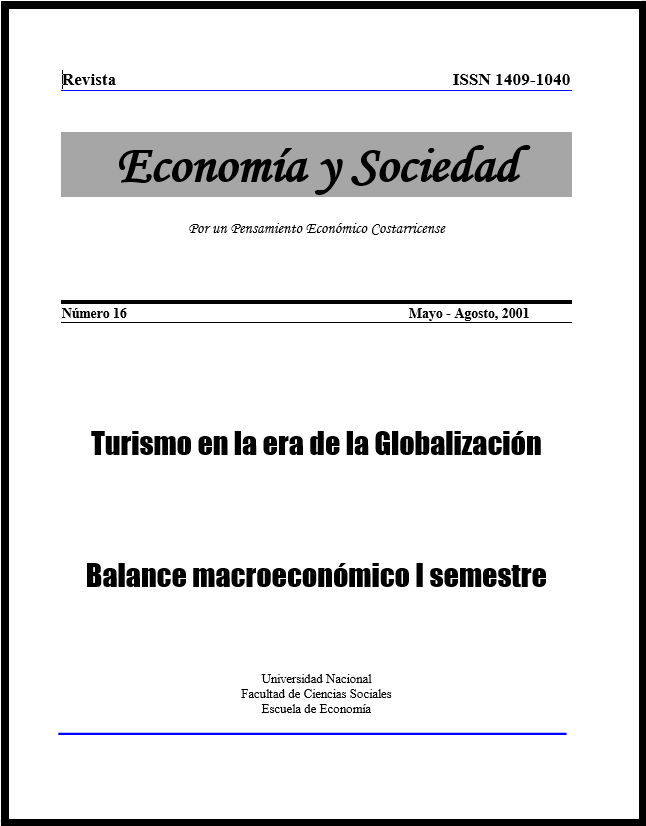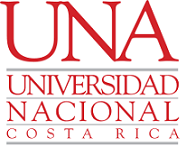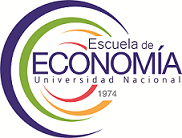TURISMO EN LA ERA DE LA GLOBALIZACIÓN: IMPLICACIONES DE EQUIDAD PARA LA SOCIEDAD Y EL AMBIENTE INTERNACIONAL
Keywords:
Turismo, globalización, equidad, sector, estrategia.Abstract
Es bastante sorprendente que para un sector económico tan dinámico como el turismo no existan análisis comprensivos y realmente serios, sobre su impacto en el desarrollo sostenible en el ámbito internacional. Sin duda alguna, hay una discusión amplia sobre problemas de transporte y viaje, particularmente de viajes aéreos para fines turísticos, con relación al efecto de calentamiento atmosférico (“greenhouse effect”).1 Así mismo, recientemente se han llevado a cabo una serie de estudios sobre el impacto local (positivo y negativo) del turismo en la economía, la vida sociocultural, el ambiente, etc. (ver las diferentes contribuciones en Hein 1997). Sin embargo, en el nivel de una estrategia internacional se pueden encontrar mayormente sobre-generalizaciones inaceptables de tales estudios de impacto, las cuales condenan (como ONGs más radicales) o elogian el turismo (como algunos escritos sobre eco-turismo), pero con razonamientos igualemente poco diferenciados y mayormente superficiales.
References
Acuña Ortega, M., D. Villalobos Céspedes y K. Ruiz Mejías 2000: El Cluster Ecoturístico de Monteverde/ Costa Rica, Heredia
Ayres, R.U. 1994: Industrial Metabolis m: Theory and Policy, en: Ayres/Simonis (eds.), 3-21.
Bringezu (Hrsg.) 1995. Neue Ansätze der Umweltstatistik: Ein Wuppertaler Werkstattgespräch., Basel et.al.: Birckhäuser - Wuppertal Texte, 26-54.
Bringezu, S. y H. Schütz 1995: Wie misst man die ökologische Zukunftsfähigkeit einer Volkswirtschaft? Ein Beitrag zur Stoffstrombilanzierung am Beispiel der Bundesrepublik Deutschland, en: Bringezu (Hrsg.), 26-54.
BUND und MISEROR (Hrsg.) 1996: Zukunftsfähiges Deutschland. Ein Beitrag zu einer global nachhaltigen Entwicklung, Basel u.a.: Birckhäuser.
British Airways 2000: Social and Environmental Report, Harmondsworth
Castells, M. 1996-1998: The Information Age. Economy, Society and Culture, Vol. 1 (1996), Vol. 2 (1997), Vol.3 (1998), Oxford, Oxford University Press.
Deutscher Bundestag 1997: Drucksache 13/9446 (Bericht des Ausschusses für Bildung, Wissenschaft, Forschung, Technologie und Technikfolgenabschätzung. Technikfolgenabschätzung, hier: "Entwicklung und Folgen des Tourismus". Einleitende Stellungnahme des Ausschusses). Deutscher Bundestag 1999: Drucksache 14/1100 (Bericht des Ausschusses für Bildung, Forschung und Technikfolgenabschätzung. Technikfolgenabschätzung, hier: "Entwicklung und Folgen des Tourismus" Bericht zum Abschluß der Phase II
FoEN-Friends of the Earth Netherlands (ed.) 1993: Action Plan Sustainable Netherlands, Amsterdam, The Netherlands.
FoEE-Friends of the Earth Europe (ed.) 1995: Towards Sustainable Europe, Brussels, Belgium.
FoEI-Friends of the Earth International 1997, Trade, Environment and Sustainability, in: Internetwebsite: http://www.foe.co.uk/foei/tes.
Fürst, E. 1997: Ecological Structural Change in a Globalising World: An Interpretative Inquiry into the Meaning of Environmental Space for the Development Process in the South, Working Paper, Heredia, Costa Rica: Centro Internacional de Política Económica para el Desarrollo Sostenible (CINPE); en proceso de publicación en: International Journal of Economic Development, Special Issue on Sustainable Development, 2000-2001.
--------- 1998: El debate actual sobre indicadores de sostenibilidad, ponencia y material de consulta reproducidos en: Rodríguez, Adrián and Érica Vega (eds.). Promoviendo un cambio de actitud hacia el desarrollo sostenible, MIDEPLAN-BID: Proyecto Sistema Nacional para el Desarrollo Sostenible, San José, C.R.: MIDEPLAN 1998.
---------- 1999: Globaler Ressourcenverbrauch, Umweltraum und ökologischer Strukturwandel – Implikationen für die Nord-Süd-Beziehungen, in: Wolfgang Hein / Peter Fuchs (eds.), Globalisierung und ökologische Krise, Hamburg, 77-124.
---------- 2000a: Cambio estructural multidimensional: algunas lecciones epistemológicas y metodológicas, en: Fürst, E (ed.) 2000: Costa Rica: cambio estuctural en la economía y el ambiente. Una evaluación de múltiples criterios, Heredia, Costa Rica: Editorial UNA.
---------- 2000b: Globalización, espacio ambiental y cambio estructural desde la perspectiva del Sur, en: Costa Rica: cambio estuctural en la economía y el ambiente. Una evaluación de múltiples criterios, Heredia, Costa Rica: Editorial UNA.
Funtowitz, S. y J. Ravetz 1995: Global environmental change and sustainable development: Beyond interdisciplinarity, in: J.Jäger / A. Liberatore / K.Gundlach (eds.), Global environmental change and sustainable development in Europe, Luxemburg (European Commission) , 45-50
Gander, S. y N. Helme 1999: Emissions trading is an effective, proven policy tool for solving air pollution problems, en: ICAO Journal 54, 7: 12- 14, 28s.
Ghimire, K.B. 1997: National and Regional Mass Tourism Development in the South:A New Panacea?”,in: Hein 1997, pp. 225-250
Görg, C. 1994: Der Institutionenbegriff in der Theorie der Strukturierung, in: J. Esser/ C. Görg/ J.Hirsch (eds.), Politik, Institutionen und Staat. Zur Kritik der Regulationstheorie, Hamburg, pp. 31-84.
Hein, W. (ed.) 1997: Tourism and Sustainable Development, Hamburg.
---------- 1999: Postfordistische Globalisierung, Global governance und Perspektiven eines evolutiven Prozesses “Nachhaltiger Entwicklung”, en: ibid./ Peter Fuchs, Globalisierung und ökologische Krise, Hamburg, 13-76
----------- 1999a:“Versunkenes Land”? Globalisierung, Archipelisierung und die Perspektiven marginalisierter Raeume,in: NordSüd aktuell, vol.xiii, no.3, 403-417.
----------- 2000: Global Governance and the Evolution of a New Role of International Financial and Economic Institutions for Sub-Saharan Africa, en: African Development Perspectives Yearbook , No.9, forthcoming.
Luks, F. 1996: “Post-Normal Science” und Dematerialisierung. Über den (wirtschafts) wissenschaftlichen Umgang mit Umweltproblemen, Wuppertal, in: Köhn, J./Welfens, M.J. (Hg.), Neue Ansätze der Umweltökonomie, Marburg: Metropolis, 89-108.
Norgaard, R. B. 1994: Development Betrayed. The End of Progress and a Coevolutionary Revisioning of the Future, London and New York: Routledge.
North, D. 1990: Institutions, Institutional Change and Economic Performance, Cambridge
OECD 1995: Sustainable Consumption and Production: Clarifying the Concepts. OECD Workshop, Rosendal, Norway, 2-4 july 1994. Final Report, Paris: OECD (mimeo).
Hein, W. und K. Siefke 2001: Postfordistische Raumstrukturen und Staat: Tourismusregionen zwischen Archipelisierung und Autozentrizität, en: Peter Gärtner (ed.) 2001: Staatlichkeit in Afrika, Asien, Lateinamerika im Vergleich unter den Bedingungen eines verschärften internationalen Wettbwerbs, Hamburg, en proceso de publicación.
Hinterberger, F. and F. Schmidt-Bleek (1999): Dematerialisation, MIPS and Factor 10. Physical sustainability indicators as social device. en: Ecological Economics 29 (1), pp. 53 – 56
Horster, D. 1998: Politische Perspektiven in Niklas Luhmanns Systemtheorie, in: Vorgänge, no.111, pp.61-72
IPCC 1999: Informe Especial del IPCC. La Aviación y la Atmósfera Global. Resumen para responsables de políticas, Geneva/ Nairobi
Lipietz, A. 1985: Akkumulation, Krisen und Auswege aus der Krise: Einige methodische Überlegungen zum Begriff "Regulation", en: Prokla, No.58/ März 1985: 109-137
Lipietz, A. 1986: Mirages et Miracle. Problèmes de l’industrialisation dans le tiers monde, Paris
Luhmann, N. 1997: Die Gesellschaft der Gesellschaft, 2 vols., Frankfurt/M., Suhrkamp
Opschoor, J. B. (ed.) 1992: Environment, Economics and Sustainable Development, Amsterdam: Association of Post-Keyensian Studies/WoltersNoordhoff Publishers.
-------- 1995: Ecospace and the Fall and Rise of Throughput Intensity, en: Ecological Economics, 15: 2, 137-140.
Page, S.J. 1999: Transport and Tourism, Harlow y Singapore.
Pasche, M. 1994: Ansätze einer evolutorischen Umweltökonomik, en: Beckenbach, F. / H. Diefenbacher (eds.) 1994, Zwischen Entropie und Selbstorganisation. Perspektiven einer ökologischen Ökonomie, Marburg: Metropolis, 75-118
Prigogine, I,. and I. Stengers 1984: Order out of Chaos. Man’s New Dialogue with Nature, New York, u.a._ Bantam Books.
Schallaböck, K.O. 1997: Tourism, Transport and Ecology, in: Hein 1997, pp. 339-358
Schmidt-Bleek, F. 1994: Wieviel Umwelt braucht der Mensch? MIPS - Das Mass für ökologisches Wirtschaften, Basel u.a.: Birkhäuser.
Schmidt-Bleek et al. (Hg.) (1998): MAIA – Einführung in die Materialintensitätsanalyse nach dem MIPS Konzept. Basel et al. (Birkhäuser)
Spangenberg. J. 1996: Integración de criterios en el concepto de sostenibilidad, en: Espacios. Revista Centroamericana de Cultura Política, No. 7 (enero – junio), pp. 4-23.
Sucharek, N. 2000: Ausgebucht: Zivilisationsfluch Tourismus, Stuttgart (Schmetterling Verlag).
Veltz, P. 1996: L’économie de l’archipel, Paris.
Wackernagel, M. and W. Rees 1994: 1996: Our Ecological Footprint. Reducing Human Impact on the Earth, Gabriola Island, BC, Canada and Philadelphia, PA, USA: New Society Publishers.
------------- 1997: Perpetual and Structural Barriers to Investing in Natural Capital: Economics from an Ecological Footprint Perspective; in: Ecological Economics, 20:1, 3-24.
Willke, Helmut 1997: Supervision des Staates, Frankfurt/M.
Downloads
Published
How to Cite
Issue
Section
License
This publication is subject to the Creative Commons License; therefore, its attributions and restrictions must be respected.
Authors publishing in this Journal accept the following conditions:
- Authors retain copyright ownership and give the Journal first publication right of the paper, which is registered with the Creative Commons Attribution-NonCommercial-ShareAlike 4.0 International License. This license allows third parties to use the published work provided it is sourced as firstly published in this Journal.
- Authors may enter into other independent and additional contractual agreements for the non-exclusive distribution of the article published in this Journal (e.g., to be included in an institutional repository or published in a book) provided it is clearly stated that the work was published in this Journal for the first time.
- Authors are allowed and recommended to publish their work on the Internet (for example, on institutional or personal pages) before and during the review and publication process, as it can lead to productive exchanges and a greater and faster dissemination of work published.

The Economía & Sociedad Journal, published by Universidad Nacional, is licensed under a Creative Commons Reconocimiento-NoComercial-CompartirIgual 4.0 Internacional License. Based on http://www.revistas.una.ac.cr/index.php/economia.








